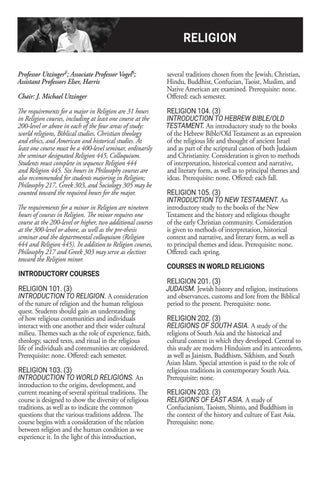psychology
124
RELIGION Professor UtzingerF; Associate Professor VogelS; Assistant Professors Elser, Harris Chair: J. Michael Utzinger The requirements for a major in Religion are 31 hours in Religion courses, including at least one course at the 200-level or above in each of the four areas of study: world religions, Biblical studies, Christian theology and ethics, and American and historical studies. At least one course must be a 400-level seminar, ordinarily the seminar designated Religion 445, Colloquium. Students must complete in sequence Religion 444 and Religion 445. Six hours in Philosophy courses are also recommended for students majoring in Religion; Philosophy 217, Greek 303, and Sociology 305 may be counted toward the required hours for the major. The requirements for a minor in Religion are nineteen hours of courses in Religion. The minor requires one course at the 200-level or higher, two additional courses at the 300-level or above, as well as the pre-thesis seminar and the departmental colloquium (Religion 444 and Religion 445). In addition to Religion courses, Philosophy 217 and Greek 303 may serve as electives toward the Religion minor. INTRODUCTORY COURSES RELIGION 101. (3) INTRODUCTION TO RELIGION. A consideration of the nature of religion and the human religious quest. Students should gain an understanding of how religious communities and individuals interact with one another and their wider cultural milieu. Themes such as the role of experience, faith, theology, sacred texts, and ritual in the religious life of individuals and communities are considered. Prerequisite: none. Offered: each semester. RELIGION 103. (3) INTRODUCTION TO WORLD RELIGIONS. An introduction to the origins, development, and current meaning of several spiritual traditions. The course is designed to show the diversity of religious traditions, as well as to indicate the common questions that the various traditions address. The course begins with a consideration of the relation between religion and the human condition as we experience it. In the light of this introduction,
several traditions chosen from the Jewish, Christian, Hindu, Buddhist, Confucian, Taoist, Muslim, and Native American are examined. Prerequisite: none. Offered: each semester. RELIGION 104. (3) INTRODUCTION TO HEBREW BIBLE/OLD TESTAMENT. An introductory study to the books of the Hebrew Bible/Old Testament as an expression of the religious life and thought of ancient Israel and as part of the scriptural canon of both Judaism and Christianity. Consideration is given to methods of interpretation, historical context and narrative, and literary form, as well as to principal themes and ideas. Prerequisite: none. Offered: each fall. RELIGION 105. (3) INTRODUCTION TO NEW TESTAMENT. An introductory study to the books of the New Testament and the history and religious thought of the early Christian community. Consideration is given to methods of interpretation, historical context and narrative, and literary form, as well as to principal themes and ideas. Prerequisite: none. Offered: each spring. COURSES IN WORLD RELIGIONS RELIGION 201. (3) JUDAISM. Jewish history and religion, institutions and observances, customs and lore from the Biblical period to the present. Prerequisite: none. RELIGION 202. (3) RELIGIONS OF SOUTH ASIA. A study of the religions of South Asia and the historical and cultural context in which they developed. Central to this study are modern Hinduism and its antecedents, as well as Jainism, Buddhism, Sikhism, and South Asian Islam. Special attention is paid to the role of religious traditions in contemporary South Asia. Prerequisite: none. RELIGION 203. (3) RELIGIONS OF EAST ASIA. A study of Confucianism, Taoism, Shinto, and Buddhism in the context of the history and culture of East Asia. Prerequisite: none.



















